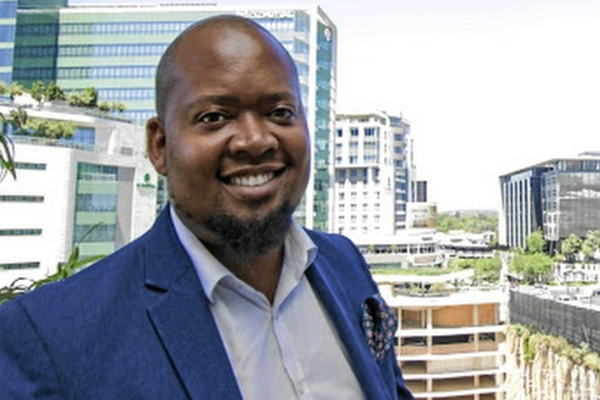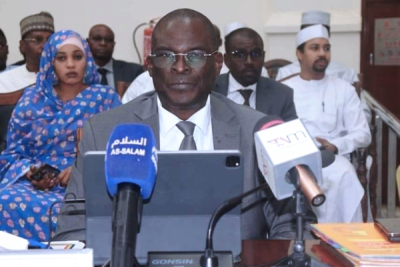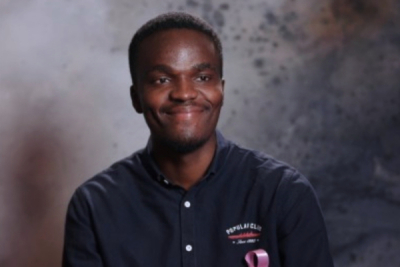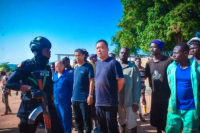He aims to transform small businesses' access to capital and make financing easier for them. To achieve this, he is relying on technology as a key tool.
Luyanda Jafta (photo), a South African investment expert and entrepreneur, is the founder and CEO of The People’s Fund (TPF), a financial company he established in 2017. TPF operates as a crowdfunding platform that helps businesses raise capital to fulfill government or corporate orders, providing the financial support they need to complete their contracts. The platform also allows individuals to support these businesses' growth, improving their access to financing.
Jafta is also the founder and CEO of The People’s Stokvel, a sister company to TPF, which enables South Africans to invest in small businesses owned by Black entrepreneurs.
In addition, Jafta leads Paybook, a digital agency he founded in 2012. Paybook lets subscribers share brand campaigns on their profiles, earning rewards based on unique visitors, leads, or sales commissions generated for the brands.
As a serial entrepreneur, Jafta’s ventures include Whole In One, a student and youth-focused journal he launched in 2010, and Box A Veg, a home delivery service for organic produce founded in 2016. Box A Veg supports small farmers by providing steady income while offering South Africans an easy way to access healthy foods.
Jafta holds a bachelor’s degree in economics, insurance, and investment from the University of the Witwatersrand, earned in 2011.
Melchior Koba
She is a key figure in the DRC's tech and entrepreneurial ecosystem. Her work has earned her numerous awards and accolades.
Medi Kebantima (photo), a Congolese telecommunications engineer and tech entrepreneur, is the founder and CEO of INNOV SARLU, an IT company specializing in engineering and technological innovation projects. INNOV SARLU provides technology training and services in home automation, robotics, artificial intelligence, and IT solutions. One of its flagship products is Kisi App, a digital health solution designed to check the authenticity of medications.
Kisi App leverages artificial intelligence to check medicines for authenticity. It includes an electronic device capable of performing molecular analyses on drugs, with results sent to a dedicated application. This tool is mainly intended for pharmacies, laboratories, customs services, and pharmaceutical inspectors.
Beyond Kisi App, Kebantima has launched Jeuneuriat, a program encouraging youth entrepreneurship in Congo through creative, engaging learning experiences.
Kebantima holds a telecommunications engineering degree from the Higher Institute of Applied Techniques in Kinshasa, completed in 2018, and is currently pursuing a master’s in cybersecurity at the Paris School of Technology & Business. In 2022, she won first prize in the Citypreneurs competition, awarded by the United Nations Development Program (UNDP), and was named a TotalEnergies Startupper of the Year for Best Business Project Idea. Most recently, she was recognized among the “50 femmes qui inspirent” (50 most inspiring woment) in 2024 in the Science and ICT category.
Melchior Koba
Chadian citizens frequently complain about poor telecom services, particularly internet quality. The latest major outage occurred on October 15 and lasted about 24 hours.
Boukar Michel (photo), Chad’s Minister of Communications, Digital Economy, and Digitalization of Administration, has announced a series of projects aimed at modernizing the national telecom network and reducing consumer costs. He addressed the National Transitional Council on November 5, following the adoption of a law amending Article 13 of the Regulatory Authority for Electronic Communications and Postal Services (ARCEP).
A New Mobile Operator to Enter the Market
One of the key initiatives includes the upcoming launch of Salam, a subsidiary of the state-owned operator Sotel, which will end the current duopoly of Airtel and Moov Africa. In Q3 2024, Moov Africa Chad, a subsidiary of Maroc Telecom Group, reported 6.7 million subscribers and held a 55% market share as of September 2023, making it the market leader.
The entry of Salam is expected to increase competition, ultimately benefiting Chadian consumers seeking better quality services at more affordable prices.
Additionally, the government aims to sell 60% of its stake in Sotel to a private investor to bring in the technical and financial resources needed to revitalize the operator and make it more competitive against Airtel and Moov Africa. Sotel’s fixed and mobile subscriber base has declined over the past seven years, reaching only 23,907 in 2020, according to ARCEP.
Improved Telecom Infrastructure
Michel also announced plans to deploy 200 telecom sites with 3G and 4G capabilities to improve nationwide coverage. According to the International Telecommunication Union's (ITU) DataHub, 3G and 4G networks covered 68% and 36% of the population in 2022, respectively. While 2G coverage reached 86.8%, 5G is yet to be deployed in Chad.
This infrastructure upgrade aims to improve service quality amidst a recent decline in telecom availability. The latest significant outage on October 15 lasted approximately 24 hours, and just ten days later, Airtel Chad experienced a service disruption affecting voice, SMS, and internet for several hours.
These infrastructure investments align with the government’s strategy to strengthen the digital network, particularly through the Trans-Saharan Fiber Optic Backbone project. This initiative will connect Chad with neighboring countries, providing indirect access to undersea cables via coastal nations such as Nigeria, Benin, and Algeria, each linked to multiple undersea cables. The project is expected to be completed by late 2024 or early 2025.
These expanded capacities should enhance internet quality in Chad, a landlocked nation currently reliant on Cameroon and Sudan for its international connectivity.
Starlink
The minister also revealed ongoing discussions with satellite internet provider Starlink. The government anticipates that SpaceX’s Starlink subsidiary will help drive down internet costs.
Starlink plans to begin commercial operations in Chad in 2025, pending regulatory approvals. Pricing details for Chad are not yet available. However, in Benin, where Starlink launched in November 2023, the monthly subscription costs 30,000 CFA francs (around $50), with a one-time terminal cost of 400,000 CFA francs.
Isaac K. Kassouwi
After graduating from several accelerator programs, the startup has firmly established itself in Morocco's logistics market. Now, with the backing of various investors, it plans to expand its operations beyond national borders.
Colis.ma is a logistics solution developed by a Moroccan startup, enabling both businesses and individuals to send and receive parcels across six European countries. Founded in 2022 by Issam Darui and based in Oujda, the startup recently raised $300,000 in an October funding round to fuel its growth.
The company plans to use the funds to expand its coverage in Morocco’s five largest regions and establish more connections between African and European countries, beginning with West Africa. Commenting on the funding, Darui stated, “This funding allows us to broaden our geographic coverage and further improve the quality of our services. [...] Our goal is to become a key player in logistics between Africa and Europe, offering innovative technological solutions to a sector undergoing transformation.”
Colis.ma offers a mobile app available on iOS and Android, where users can create accounts to access its services. Currently, the startup operates in France, Spain, Luxembourg, Belgium, Germany, and the Netherlands. The parcel shipping process involves selecting the sender and recipient locations, entering the recipient’s details, filling out shipping information, and choosing the service type. Users then receive a tracking number to monitor their parcel’s real-time status.
Since its launch, the startup has joined multiple accelerator programs, including Baobab Network, Plug and Play Morocco, and Orange Corners, through which it secured a $45,000 grant.
Adoni Conrad Quenum
He envisions a future where everyone, regardless of their location or background, can benefit from technology. To this end, he's providing IT maintenance services to people in the Congo.
Erickson Kayembe (photo) is a Congolese programmer and tech entrepreneur. He is the CEO of Lisungi-Tech, a startup offering a range of services to meet the technological needs of its clients.
Founded in 2023, Lisungi-Tech provides in-home tech support for Congolese clients, addressing issues with devices and equipment. With a team of skilled and experienced technicians, the startup resolves a variety of problems, from hardware failures and software issues to Internet connectivity challenges.
"Our company was created in response to a growing need for tech support among older people. We understand that technology evolves quickly and can be hard to keep up with. That's why we’re here to support you and make technology easier," the company states.
Lisungi-Tech technicians visit clients’ homes to assess and resolve their tech issues on-site. The company also offers personalized training services to help Congolese users make the most of their tech products.
In addition, Erickson Kayembe serves as CEO of Congo-Spotlight, an organization dedicated to promoting Congolese talents and entrepreneurs it believes deserve recognition.
Kayembe, currently studying web project management at Leadership Academia University, is also the founder of Vision-X Corp in the Democratic Republic of Congo (DRC). Launched in 2020, Vision-X Corp specializes in web development, helping companies, agencies, and organizations digitalize their services.
Melchior Koba
A software engineer with years of experience at major tech companies, including Mozilla, he's now an entrepreneur working on his second startup.
Remy Muhire (photo) is a Rwandan computer scientist and tech entrepreneur. He is the co-founder and CEO of Pindo, a startup that enhances digital accessibility, particularly for those with limited literacy or technological skills.
Founded in 2020 by Muhire and Eugène Rwagasore, Pindo aims to revolutionize communication in Africa through voice-based artificial intelligence (AI). Their technology enables businesses to reach and engage millions of people in their native languages. Pindo’s AI solution converts written text into a natural-sounding voice in Kinyarwanda, Swahili, and Luganda.
Muhire is also a member of forLoop Africa, a network of software developers and tech enthusiasts across the continent. Before founding Pindo, he co-founded Exuus Ltd in 2016, a company specializing in big data. He served as Chief Technology Officer there until 2018 and remained on its board until 2020.
A computer science graduate from the University of Rwanda, Muhire began his professional career in 2012 at Digital Creations, a creative agency, where he was lead software engineer. In 2014, he became a senior software engineering consultant at Oxfam, the nonprofit dedicated to combating poverty.
In 2018, he joined Progate, an online coding education platform, where he managed growth and community engagement across Africa. In 2020, he was recruited by Mozilla, the technology company, to serve as a community manager specializing in voice technology—a role he held until 2022.
Melchior Koba
Absa Bank Zambia has launched the Cyberthon, a hackathon to address pressing cybersecurity challenges and spark innovation in digital protection.
The launch event, held in Lusaka on November 4, marked Absa’s continued commitment to advancing Zambia’s digital transformation.
The event highlighted the significance of collaboration in safeguarding Zambia's digital ecosystem. Cyberthon builds on the success of Absa’s previous hackathon, which was Zambia’s first Data Science Hackathon held last year.
Bamboo, a platform dedicated to empowering Africans to invest in global markets, has launched its new remittance app, Coins by Bamboo.
This app, announced on October 31, facilitates money transfers from the diaspora to Africa with low fees and favorable exchange rates, positioning Bamboo as a contender in the burgeoning remittance sector.
Available on both iOS and Android, the app currently supports transfers from Canada to Nigeria, with plans to expand to more regions soon.
African nations are undergoing a profound digital transformation, with increasing numbers of people coming online, and economies and societies becoming more tech-dependent. This rapid digital growth is expanding opportunities for cybercriminals, making cybercrime one of the continent's most rapidly escalating threats.
The Nigeria Police Force apprehended on November 2, 2024, 130 suspects over alleged involvement in cybercrimes and activities that threaten national security. The suspects include 113 foreign nationals-predominantly Chinese and Malaysian - as well as 17 Nigerian collaborators.
Force Public Relations Officer, ACP Olumuyiwa Adejobi, confirmed that police are conducting “thorough investigations and scientific analysis” of evidence gathered from the suspects. “The suspects will be charged to court upon conclusion of our investigations,” he stated, pledging to provide further updates on the case’s progress.
This crackdown is crucial as cybercrime continues to escalate in Nigeria and across Africa, posing severe economic threats. The INTERPOL African Cyberthreat Assessment Report 2024 highlights that the continent lost over $4 billion annually to cybercrime in 2021. By 2023, Africa experienced a 23% year-on-year increase in average weekly cyberattacks per organization—the highest rate globally.
Furthermore, the Cybersecurity Experts Association of Nigeria (CSEAN) revealed in its National Cyberthreat Forecast 2024 that in 2023, Nigeria faced a sharp rise in ransomware attacks, marking it as the year's top cyber threat. This surge was fueled by ransomware-as-a-service, allowing even low-skilled individuals to launch complex attacks. Active groups like ALPHV, 0XXX Virus, DJVU, and the Cobalt Strike toolkit highlighted the attacks' diversity. Both public and private sectors suffered, incurring losses in the billions of Naira due to operational disruptions and costly recovery.
The operation was executed by the Nigeria Police Zone 7 Command in Abuja. Under the supervision of AIG Benneth Igweh and the National Cybercrimes Centre led by CP Ifeanyi Henry Uche, officers targeted a building in the Next Cash and Carry area of Jahi, Abuja, where suspects reportedly used computers and advanced equipment for cybercriminal activities.
This operation underscores the Nigeria Police Force's ongoing commitment to tackling cybercrime and enhancing national security amidst rising digital threats across the region.
Hikmatu Bilali
In response to rising traffic violations, several countries are turning to technology to enhance road safety. Video-based ticketing is emerging as a promising tool to improve compliance with traffic laws and deter risky driving behaviors.
Seychelles Vice President Ahmed Afif announced last week, the upcoming piloting of a digital road monitoring system based on video ticketing to enhance road safety in the country.
Speaking at a cabinet press briefing on October 31st, he explained: The system “will provide the government with a lot of information, as we have seen nowadays people are driving without a valid license in addition to other illegal activities happening on the roads.”
The said system will utilize public surveillance cameras to enforce traffic laws remotely. When a violation is detected, an image of the vehicle is captured, identifying its make and reading its license plate number. A traffic officer can then issue an electronic ticket remotely, which is sent to the driver via message. Targeted infractions include speeding, using a phone while driving, and not wearing a seatbelt.
The eight-week pilot project will be launched in the Roche Caïman district on Mahé Island. During this phase, authorities will assess and fine-tune the technology to fit local needs. The trial results will be critical, guiding future infrastructure planning and traffic law enforcement. If successful, the system may be permanently implemented in partnership with Australian technology firm Acusensus.
This initiative is part of the government’s strategy to combat dangerous driving behaviors. If adopted, it will target key causes of road insecurity, particularly in urban areas, and promote lasting changes in driver behavior. The system would also streamline and accelerate the processing of violations, reducing the burden on law enforcement and increasing the efficiency of traffic law enforcement.
Samira Njoya
More...
Earlier last year, Algerian authorities launched the digitization of the national agricultural registry. They have completed the digitization goal ahead of schedule.
On Sunday, November 3, Mohamed Yazid Hambli, President of Algeria's National Chamber of Agriculture, announced the completion of the digitization of the National Agricultural Registry (RNA). The announcement was made during the opening ceremony of the second National Exhibition of Agricultural Equipment, Products, Livestock, Agribusiness, and Refrigeration in Mascara.
"The process of digitizing the National Agricultural Registry, initiated early last year and carried out by the National Chamber of Agriculture, is now fully complete. This initiative has allowed for the issuance of digital cards to farmers across all 58 wilayas," stated Mohamed Yazid Hambli (photo, center).
Under President Abdelmadjid Tebboune, Algeria has leveraged digital transformation as a driver of development since 2019, achieving substantial progress on various digital indicators. According to the International Telecommunication Union, Algeria reached a score of 80.9 on the ICT Development Index in 2024, up from 77.8 in 2023, marking a notable advancement in the tech sector.
However, the digitization of the RNA faces several challenges. Farmers and local agents require training to effectively use digital tools, while limited access to telecommunications networks in rural areas hinders connectivity. Robust measures are also essential to protect the privacy and security of farmers' sensitive data. These obstacles could reduce the initiative's effectiveness if not addressed.
If these challenges are overcome, the RNA digitization could transform agricultural resource management by enabling better monitoring of land, crops, and water resources. It would allow for more targeted subsidies and aid based on farmers' actual needs and improve transparency in production chains. By facilitating precise resource management and enhancing transparency in the agricultural sector, this initiative could support more sustainable and equitable agricultural development.
Adoni Conrad Quenum
She has over 10 years of experience in digital marketing and data management. As an entrepreneur, she strives to help organizations deliver the best services to underserved communities.
Sandra Awilli (photo) is a Ugandan serial entrepreneur. She is the founder and CEO of ShareCARD, a startup that leverages digital technology to support vulnerable populations across Africa.
Founded in 2022, ShareCARD aims to enhance the effectiveness of development projects by providing real-time data, accountability tracking tools, and impact mapping services. The platform enables users to streamline processes, optimize resources, and make well-informed decisions.
ShareCARD simplifies data collection, verification, and analysis, giving organizations up-to-date insights on beneficiaries' access to programs, which allows for swift responses to identified needs.
Before ShareCARD, Sandra Awilli founded Boldite Ltd in 2016, a digital marketing and creative agency that helps African businesses expand into online markets. In 2017, she launched PADShare Uganda, a tech startup focused on improving access to essential menstrual hygiene products.
Sandra Awilli holds a certification in social media training from Kyambogo College School, earned in 2012. Her career began in 2013 as a digital marketing manager for beverage brands Bell Lager and Smirnoff, as well as for Centenary Bank. From 2021 to 2022, she worked as a project manager for Africa 118 in Uganda, a Canadian company specializing in digital marketing, website design, and data services.
Melchior Koba
As part of its digital economy development plan, Nigeria is placing a strong emphasis on securing strategic partnerships. Each state in the country is ramping up efforts to deliver high-quality digital services to its citizens.
On Wednesday, October 30, Benue State Governor Hyacinth Iormem Alia (photo, center) announced a strategic partnership with Chinese tech group Huawei to accelerate digital transformation across the region. This agreement aims to modernize Benue's infrastructure, boost its economy, and improve the quality of life for its residents.
“This partnership with Huawei will revolutionize our state's infrastructure, enhance security, improve education [and] healthcare, and create countless job opportunities for our people. We must be intentional about the development of our state, for ourselves [and] future generations,” the governor explained on X (formerly Twitter).
The initiative is part of a broader effort to establish Benue State as a digital hub in Nigeria. It follows a recent agreement with EVNT Technologies, a Saudi-based IT company, to transform Benue’s technological landscape.
The Huawei partnership is expected to bolster local digital initiatives, particularly the Benue Tech Skills program, which aims to create over 50,000 jobs by training young people in essential digital skills. The program includes training in coding, advanced data analysis, UI/UX design, digital marketing, and e-commerce—all critical skills for the global digital economy.
These efforts align with the goals set by Nigeria’s Federal Ministry of Communications, Innovation, and Digital Economy under its strategic plan, “Accelerating our Collective Prosperity through Technical Efficiency.” This plan seeks to raise the digital sector’s contribution to Nigeria’s GDP to 22% by 2027, positioning the country as a leader in digital economy and tech innovation in Africa.
Samira Njoya
He has over 25 years of experience in developing digital services in Africa. His innovative solutions have earned him numerous awards and distinctions, both nationally and internationally.
Jil-Alexandre N’Dia (photo) is an Ivorian entrepreneur and the co-founder of Weblogy, a fintech and digital media group that aims to accelerate digital transformation across Africa.
Founded in 1998, Weblogy provides digital services primarily in French-speaking Africa, creating websites, mobile applications, and online marketing campaigns that deliver commercial advantages for businesses and brands. The company’s mission is to support African nations' development by integrating new technologies.
Beyond digital activities, Weblogy also offers consulting services and provides co-working spaces for startups to help them develop their projects. It is also committed to promoting financial inclusion and meeting the growing need for fast, secure payment solutions. Since 2016, it has offered Abidjan.net-branded prepaid VISA cards, designed in partnership with VISA and local banks. These reloadable e-wallets do not require a bank account. To simplify online payments, Weblogy also launched an application called APAYM, a portal that enables users to manage their Abidjan.net cards along with other domestic and international bank cards.
To date, Weblogy has completed more than 3,000 web and mobile projects for a portfolio of over 700 international clients. The company operates an independent ad network covering 48 countries, reaching over 20 million unique visitors per month, and is present in 11 countries through six offices and six commercial representations.
Jil-Alexandre N’Dia is also the president of the NGO J’aime Jacqueville, which promotes financial inclusion in rural areas, the spread of new technologies, and health and wellness initiatives. Additionally, he serves as vice president of the Kaydan Foundation. Founded by a group of Ivorian entrepreneurs, this organization seeks to foster a strong entrepreneurial culture in Africa, particularly in Côte d’Ivoire.
N’Dia holds a bachelor’s degree in Information Systems Management from Indiana University Bloomington, earned in 1999. He was honored with the Ivorian President's Youth Entrepreneurship Excellence Award in 2013 and received the second prize for Communication Development in 2019.
He is an Officer of the National Order of Côte d’Ivoire and of the Order of Ivorian Merit. In 2021, he received the award for Best Fintech in Francophone Africa, presented by Global Technology Partners in partnership with Visa. In 2022, N’Dia was promoted to Commander of the Order of Merit for Posts and Telecommunications in Côte d’Ivoire.
Melchior Koba















